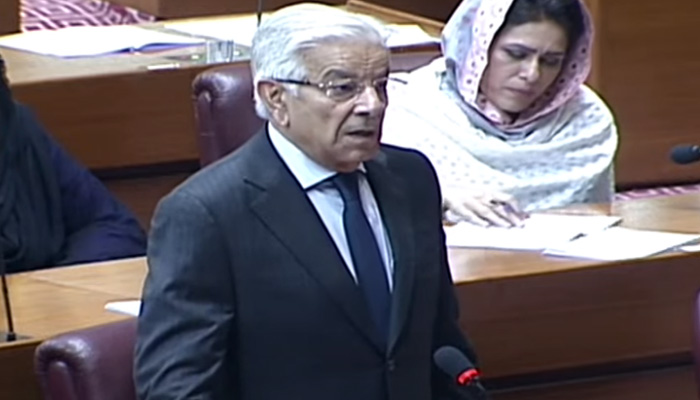
- KP chief executive must not have given statement: defence czar.
- Terms CM Ali Amin Gandapur’s statement extremely dangerous.
- KP CM announced sending team to Kabul without Centre’s approval.
Defence Minister Khawaja Asif has come down hard on Khyber Pakhtunkhwa (KP) Chief Minister Ali Amin Gandapur’s statement about holding direct dialogue with the Taliban government in Afghanistan, calling it a direct attack on the federation.
Addressing an event of the Peshawar Bar Council Association a day earlier, CM Gandapur announced sending a provincial government delegation to neighbouring Afghanistan to hold dialogue and settle bilateral issues without waiting for the federal government’s approval as his “province is bleeding” due to a surge in terrorist attacks.
Asif, speaking on the floor of the National Assembly on Thursday, said that the provicial chief executive must not have given the statement.
He added that no province has the authority to negotiate directly with any country, and in this context, the statement made by CM Gandapur, is extremely dangerous.
Pakistan has witnessed a spike in terrorist attacks since the Taliban rulers returned to power in Afghanistan in 2021, particularly in the bordering provinces of KP and Balochistan.
KP alone witnessed 25 casualties in the 29 terrorist attacks during August.
Islamabad has time again called on the interim Afghanistan government to prevent its land from being used by the banned Tehreek-e-Taliban Pakistan (TTP) and other militant organisations for carrying out attacks against Pakistan.
Citing the rise in terror incidents, the federal cabinet in June this year approved Operation Azm-e-Istehkam, a reinvigorated national counter-terrorism campaign following the Central Apex Committee’s recommendations under the National Action Plan to root out terrorism.
Additionally, the government had also introduced a major policy shift under a decision to stringently enforce international laws at its borders with Afghanistan earlier this year, to restrict the influx of militants and smuggled goods into the country.
Afghanistan does not recognise the Durand Line, the border between the two countries, arguing it was created by the British to divide ethnic Pashtuns.
The 2,640km border was established in 1893 through an agreement between British-ruled India and Abdur Rahman Khan, then ruler of Afghanistan.
Both countries share 18 crossing points, with Torkham and Chaman being the most frequently used for trade and movement of people. These crossings also connect Balochistan to Afghanistan’s southern Kandahar province.
In 2017, Pakistan started fencing the border with Afghanistan to contain terrorist cross-border movement, a move condemned by Kabul.



